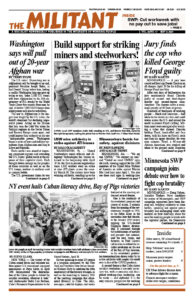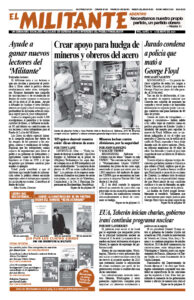The U.S. rulers’ 20-year-long war in Afghanistan will be brought to an end, promised President Joseph Biden, as had Donald Trump before him, halting a conflict Washington long ago gave up trying to win. Some 2,500 U.S. troops will leave Afghanistan by the 20th anniversary of 9/11 attacks by the World Trade Center five months from now, he said. A further 7,000 NATO troops from allied powers will also be withdrawn.
The war in Afghanistan is the longest ever fought by the U.S. rulers, the world’s dominant but declining imperialist power. Acting on the illusion that they won the Cold War when the Stalinist regimes in the Soviet Union and Eastern Europe came apart, and could impose their authority as the one “indispensable power,” Washington began a series of wars and military operations from Afghanistan and Iraq to Libya and Pakistan.
Each conflict was aimed at imposing compliant regimes and extending the U.S. rulers’ global reach at the expense of their capitalist rivals. Each brought down carnage on the peoples of those countries as well as on the U.S. troops, workers in uniform used as cannon fodder.
The U.S. government claims its war in Afghanistan was intended to prevent another 9/11 attack. But the massive use of military might there was primarily aimed at “persuading” governments across the region “that continuing to get crosswise with Washington is not only against their class interests but contrary over any extended period to their own survival,” a 2005 Socialist Workers Party resolution explained.
Attack on popular revolution
A popular revolution swept Afghanistan in 1978 bringing to power the Stalinist-led People’s Democratic Party of Afghanistan. It legalized trade unions, canceled peasants’ debts to landlords, enabled oppressed nationalities to publish and broadcast in their own languages for the first time, and promised to expropriate large landowners and distribute land to peasants.
But this government never tried to mobilize working people to carry out these measures and to take command of their lives. As conditions worsened, the PDPA government became isolated.
Moscow intervened in 1979 to back one faction within the PDPA engaged in a murderous assault against another. Then it sent an invading force to prop up the PDPA regime against a rebellion led by landlords and other reactionary forces, backed by Washington. Moscow’s 10-year war against these Islamist forces became increasingly unpopular at home. Its defeat and anti-government sentiment were among the causes of the collapse of the Stalinist regime in the Soviet Union in 1991.
The Taliban forces took power in 1996 and allowed al-Qaeda — which was led by many of the guerrilla forces the U.S. rulers had funded and armed, including Osama bin Laden — to set up bases there.
The Taliban enforced stifling political and cultural conditions on working people, driving women from public life, banning TV and music and executing anyone accused of disobeying its orders.
Washington invaded Afghanistan not only to overturn the rule of the Taliban, but also to establish a military presence across Central Asia. The Pentagon continues working on plans to bolster its forces in Tajikistan, Kazakhstan and Uzbekistan in the wake of the proposed Afghan pullout. “There’s probably not a space on the globe that the United States and its allies can’t reach” with drone strikes, boasted Defense Secretary Lloyd Austin April 14.
War devastated working people
Dubbed “Operation Enduring Freedom” by President George W. Bush, the Afghanistan war led to the deaths of an estimated 157,000 people by the end of 2019, including 2,300 U.S. military personnel. Over 5.3 million Afghans have been forced from their homes.
In 2001 Washington installed Hamid Karzai to head the government. But neither Bush nor three subsequent U.S. administrations ever established a stable regime there. The Barack Obama administration escalated U.S. troop deployment to 100,000 in 2011, without defeating the Taliban.
For more than a decade, under both Democratic and Republican administrations, the Pentagon has claimed it was close to turning the war over to the Afghan military. Despite the start of talks with the Taliban in December 2018, U.S. and allied forces continued their airstrikes, killing more civilians in 2019 than at any time since 2002.
“The Taliban are in a stronger military position now than at any point since 2001,” admitted a U.S. government report last month. It controls a fifth of the country. The U.S.-backed regime controls most major cities, with neither side in firm control of much of the rest.
At the beginning of the war the Pakistani government was transformed from a protector of the Taliban into Washington’s ally, providing the U.S. rulers with airbases to carry out bombing assaults. In 2009 it waged deadly attacks on people in areas of Pakistan controlled by the Taliban, with backup from U.S. special forces and drone strikes.
But at the same time, Islamabad continued to provide a haven for Afghan Taliban forces. This was “crucial” to the U.S. forces’ failure, complained Jack Reed, chairman of the Senate Armed Services Committee, April 15. And the Pakistani rulers have grown less dependent on Washington and have been increasingly drawn into Beijing’s orbit.
The ongoing competition and conflict between Washington and Beijing now dominates politics in the region.
Washington’s two-decade occupation of Afghanistan has done nothing to eradicate the wretched living conditions working people there face. Some 57% of adults are illiterate. The infant mortality rate is 46.5 deaths for every 1,000 births, in contrast to 5.6 in the U.S.
The U.S. capitalist rulers came out of the second imperialist world war proclaiming they would now preside over an “American century.” But they fought in Korea to a stalemate, were defeated in Vietnam, presided over war and destruction across the Middle East, and now say they’ll get out of Afghanistan.
“Working people need our own foreign policy,” Alyson Kennedy, the Socialist Workers Party’s 2021 Texas state campaign chairperson, told the Militant, “starting from solidarity with fellow working people in Afghanistan and elsewhere. We demand the immediate withdrawal of all U.S. forces from Afghanistan and across Central Asia.”

